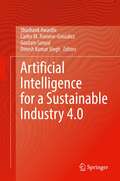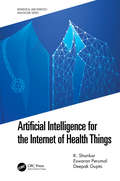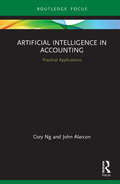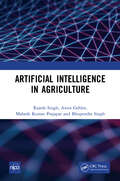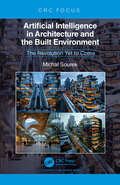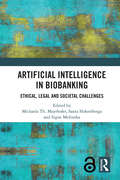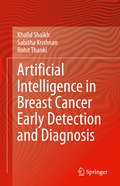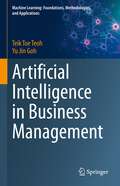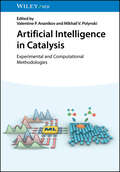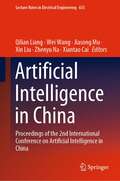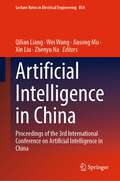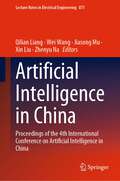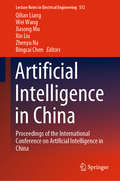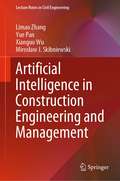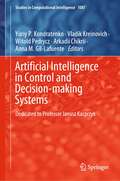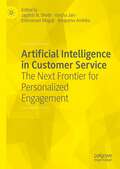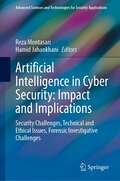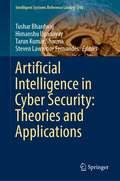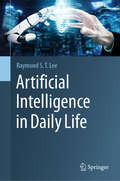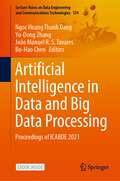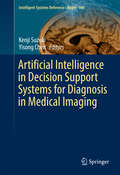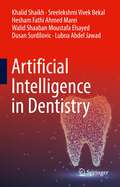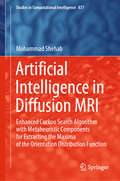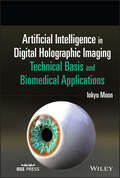- Table View
- List View
Artificial Intelligence for a Sustainable Industry 4.0
by Dinesh Kumar Singh Carlos M. Travieso-González Goutam Sanyal Shashank AwasthiThis book outlines the recent advancements in the field of artificial intelligence (AI) and addresses how useful it is in achieving truly sustainable solutions. The book also serves as a useful reference literature in developing sustainable engineering solutions to various social and techno-commercial issues of global significance. This book is organized into two sections: section 1 is focused on fundamentals and principles of AI to lay the groundwork for the second section. Section 2 explores the sustainable engineering solutions development using AI, which addresses challenges in various computing techniques and opportunities in engineering design for sustainable development using IoT/AI and smart cities. Applications include waste minimization, re-manufacturing, reuse and recycling technologies using IoT/AI, Industry 4.0, intelligent and smart grid systems, energy conservation using technology, and robotic process automation (RPA). The book is ideal for the engineers, researchers and students interested in how AI can aid in sustainable development applications.
Artificial Intelligence for the Internet of Health Things (Biomedical and Robotics Healthcare)
by Deepak Gupta K. Shankar Eswaran PerumalThis book discusses research in Artificial Intelligence for the Internet of Health Things. It investigates and explores the possible applications of machine learning, deep learning, soft computing, and evolutionary computing techniques in design, implementation, and optimization of challenging healthcare solutions. This book features a wide range of topics such as AI techniques, IoT, cloud, wearables, and secured data transmission. Written for a broad audience, this book will be useful for clinicians, health professionals, engineers, technology developers, IT consultants, researchers, and students interested in the AI-based healthcare applications. Provides a deeper understanding of key AI algorithms and their use and implementation within the wider healthcare sector Explores different disease diagnosis models using machine learning, deep learning, healthcare data analysis, including machine learning, and data mining and soft computing algorithms Discusses detailed IoT, wearables, and cloud-based disease diagnosis model for intelligent systems and healthcare Reviews different applications and challenges across the design, implementation, and management of intelligent systems and healthcare data networks Introduces a new applications and case studies across all areas of AI in healthcare data K. Shankar (Member, IEEE) is a Postdoctoral Fellow of the Department of Computer Applications, Alagappa University, Karaikudi, India. Eswaran Perumal is an Assistant Professor of the Department of Computer Applications, Alagappa University, Karaikudi, India. Dr. Deepak Gupta is an Assistant Professor of the Department Computer Science & Engineering, Maharaja Agrasen Institute of Technology (GGSIPU), Delhi, India.
Artificial Intelligence in Accounting: Practical Applications (ISSN)
by Cory Ng John AlarconArtificial Intelligence in Accounting: Practical Applications was written with a simple goal: to provide accountants with a foundational understanding of AI and its many business and accounting applications. It is meant to serve as a guide for identifying opportunities to implement AI initiatives to increase productivity and profitability. This book will help you answer questions about what AI is and how it is used in the accounting profession today. Offering practical guidance that you can leverage for your organization, this book provides an overview of essential AI concepts and technologies that accountants should know, such as machine learning, deep learning, and natural language processing. It also describes accounting-specific applications of robotic process automation and text mining. Illustrated with case studies and interviews with representatives from global professional services firms, this concise volume makes a significant contribution to examining the intersection of AI and the accounting profession. This innovative book also explores the challenges and ethical considerations of AI. It will be of great interest to accounting practitioners, researchers, educators, and students.
Artificial Intelligence in Accounting: Practical Applications (Routledge Focus on Business and Management)
by Cory Ng John AlarconArtificial Intelligence in Accounting: Practical Applications was written with a simple goal: to provide accountants with a foundational understanding of AI and its many business and accounting applications. It is meant to serve as a guide for identifying opportunities to implement AI initiatives to increase productivity and profitability. This book will help you answer questions about what AI is and how it is used in the accounting profession today. Offering practical guidance that you can leverage for your organization, this book provides an overview of essential AI concepts and technologies that accountants should know, such as machine learning, deep learning, and natural language processing. It also describes accounting-specific applications of robotic process automation and text mining. Illustrated with case studies and interviews with representatives from global professional services firms, this concise volume makes a significant contribution to examining the intersection of AI and the accounting profession. This innovative book also explores the challenges and ethical considerations of AI. It will be of great interest to accounting practitioners, researchers, educators, and students.
Artificial Intelligence in Agriculture
by Rajesh Singh Anita Gehlot Bhupendra Singh Mahesh Kumar PrajapatThis book is a platform for anyone who wishes to explore Artificial Intelligence in the field of agriculture from scratch or broaden their understanding and its uses. This book offers a practical, hands-on exploration of Artificial Intelligence, machine learning, deep Learning, computer vision and Expert system with proper examples to understand. This book also covers the basics of python with example so that any anyone can easily understand and utilize artificial intelligence in agriculture field. This book is divided into two parts wherein first part talks about the artificial intelligence and its impact in the agriculture with all its branches and their basics. The second part of the book is purely implementation of algorithms and use of different libraries of machine learning, deep learning and computer vision to build useful and sightful projects in real time which can be very useful for you to have better understanding of artificial intelligence. After reading this book, the reader will an understanding of what Artificial Intelligence is, where it is applicable, and what are its different branches, which can be useful in different scenarios. The reader will be familiar with the standard workflow for approaching and solving machine-learning problems, and how to address commonly encountered issues. The reader will be able to use Artificial Intelligence to tackle real-world problems ranging from crop health prediction to field surveillance analytics, classification to recognition of species of plants etc.Note: T&F does not sell or distribute the hardback in India, Pakistan, Nepal, Bhutan, Bangladesh and Sri Lanka. This title is co-published with NIPA.
Artificial Intelligence in Architecture and the Built Environment: The Revolution Yet to Come
by Michal SourekImagine if every architect had an apprentice who could consistently observe and understand their intentions, take over routine tasks and monitor technical, environmental, and economic constraints. This apprentice would continually improve, freeing the architect to concentrate on truly creative work.This book outlines a plan to turn this vision into reality. It evaluates the development of artificial intelligence from its inception to the present, focusing on the last two decades of applying AI in architectural design and planning; the current state of architectural practice is also examined. Integrating architecture, computer science, AI, robotics, economics, law, neurobiology, and philosophy, the vision is built on three key premises: (i) authentic, poetic creativity that transcends parameterization and algorithmizing, (ii) innovative learning strategies and training approaches not yet applied concerning architectural design, and (iii) the convergence of architecture’s inherent spatiality with virtual reality technology and new theories of human thinking and intelligence, poised for implementation in machine learning.
Artificial Intelligence in Biobanking: Ethical, Legal and Societal Challenges
by Santa Slokenberga Michaela Th. Mayrhofer Signe MežinskaThis insightful collection highlights the ethical, legal and societal issues associated with the increasing role played by artificial intelligence (AI) in medical biobanks, a key research resource in the global study of disease prevention and improving individual care.Although AI has the potential to speed up health research, the book considers numerous questions that the technology poses, from the building of trust to the prevention of harm to individuals, vulnerable groups or entire populations. Examining the tension between scientific progress and safeguarding of individual rights, and covering key issues such as accountability, data bias, transparency, and liability, the book considers the legal landscape in which biobanks operate, and what layers of governance are required to oversee such an important resource in a fluid technological age.A timely volume that brings together scholars and experts from social sciences, ethics, and law, this important book will interest researchers and professionals in Biomedicine, Law, and the broader Health Sciences.The Open Access version of this book, available at http://www.taylorfrancis.com, has been made available under a Creative Commons Attribution CC BY 4.0 license.
Artificial Intelligence in Breast Cancer Early Detection and Diagnosis
by Rohit Thanki Khalid Shaikh Sabitha KrishnanThis book provides an introduction to next generation smart screening technology for medical image analysis that combines artificial intelligence (AI) techniques with digital screening to develop innovative methods for detecting breast cancer. The authors begin with a discussion of breast cancer, its characteristics and symptoms, and the importance of early screening.They then provide insight on the role of artificial intelligence in global healthcare, screening methods for breast cancer using mammogram, ultrasound, and thermogram images, and the potential benefits of using AI-based systems for clinical screening to more accurately detect, diagnose, and treat breast cancer.Discusses various existing screening methods for breast cancerPresents deep information on artificial intelligence-based screening methods Discusses cancer treatment based on geographical differences and cultural characteristics
Artificial Intelligence in Business Management (Machine Learning: Foundations, Methodologies, and Applications)
by Teik Toe Teoh Yu Jin GohArtificial intelligence (AI) is rapidly gaining significance in the business world. With more and more organizations adopt AI technologies, there is a growing demand for business leaders, managers, and practitioners who can harness AI’s potential to improve operations, increase efficiency, and drive innovation. This book aims to help management professionals exploit the predictive powers of AI and demonstrate to AI practitioners how to apply their expertise in fundamental business operations. It showcases how AI technology innovations can enhance various aspects of business management, such as business strategy, finance, and marketing. Readers interested in AI for business management will find several topics of particular interest, including how AI can improve decision-making in business strategy, streamline operational processes, and enhance customer satisfaction. As AI becomes an increasingly important tool in the business world, this book offers valuable insights into how it can be applied to various industries and business settings. Through this book, readers will gain a better understanding of how AI can be applied to improve business management practices and practical guidance on how to implement AI projects in a business context. This book also provides practical guides on how to implement AI projects in a business context using Python programming. By reading this book, readers will be better equipped to make informed decisions about how to leverage AI for business success.
Artificial Intelligence in Catalysis: Experimental and Computational Methodologies
by Valentine P. Ananikov Mikhail V. PolynskiEnables researchers and professionals to leverage machine learning tools to optimize catalyst design and chemical processes Artificial Intelligence in Catalysis delivers a state-of-the-art overview of artificial intelligence methodologies applied in catalysis. Divided into three parts, it covers the latest advancements and trends for catalyst discovery and characterization, reaction predictions, and process optimization using machine learning, quantum chemistry, and cheminformatics. Written by an international team of experts in the field, with each chapter combining experimental and computational knowledge, Artificial Intelligence in Catalysis includes information on: Artificial intelligence techniques for chemical reaction monitoring and structural analysisApplication of artificial neural networks in the analysis of electron microscopy dataConstruction of training datasets for chemical reactivity prediction through computational meansCatalyst optimization and discovery using machine learning modelsPredicting selectivity in asymmetric catalysis with machine learning Artificial Intelligence in Catalysis is a practical guide for researchers in academia and industry interested in developing new catalysts, improving organic synthesis, and minimizing waste and energy use.
Artificial Intelligence in China: Proceedings of the 2nd International Conference on Artificial Intelligence in China (Lecture Notes in Electrical Engineering #653)
by Qilian Liang Wei Wang Jiasong Mu Xin Liu Zhenyu Na Xiantao CaiThis book brings together papers presented at The 2nd International Conference on Artificial Intelligence in China (ChinaAI) 2020, which provides a venue to disseminate the latest developments and to discuss the interactions and links between these multidisciplinary fields. Spanning topics covering all topics in artificial intelligence with new development in China, this book is aimed at undergraduate and graduate students in Electrical Engineering, Computer Science and Mathematics, researchers and engineers from academia and industry as well as government employees (such as NSF, DOD and DOE).
Artificial Intelligence in China: Proceedings of the 3rd International Conference on Artificial Intelligence in China (Lecture Notes in Electrical Engineering #854)
by Qilian Liang Wei Wang Jiasong Mu Xin Liu Zhenyu NaThis book brings together papers presented at the 3rd International Conference on Artificial Intelligence in China (ChinaAI), which provides a venue to disseminate the latest developments and to discuss the interactions and links between these multidisciplinary fields. Spanning topics covering all topics in Artificial Intelligence with new development in China, this book is aimed at undergraduate and graduate students in Electrical Engineering, Computer Science and Mathematics, researchers and engineers from academia and industry as well as government employees (such as NSF, DOD, DOE, etc).
Artificial Intelligence in China: Proceedings of the 4th International Conference on Artificial Intelligence in China (Lecture Notes in Electrical Engineering #871)
by Qilian Liang Wei Wang Jiasong Mu Xin Liu Zhenyu NaThis book brings together papers presented at the 4th International Conference on Artificial Intelligence in China (ChinaAI), Changbaishan, China, on July 23-24, 2022, which provides a venue to disseminate the latest developments and to discuss the interactions and links between these multidisciplinary fields. Spanning topics covering all topics in Artificial Intelligence with new development in China, this book is aimed at undergraduate and graduate students in Electrical Engineering, Computer Science and Mathematics, researchers and engineers from academia and industry as well as government employees (such as NSF, DOD, DOE, etc).
Artificial Intelligence in China: Proceedings of the International Conference on Artificial Intelligence in China (Lecture Notes in Electrical Engineering #572)
by Qilian Liang Wei Wang Jiasong Mu Xin Liu Zhenyu Na Bingcai ChenThis book brings together papers presented at the International Conference on Artificial Intelligence in China (ChinaAI) 2019, which provided a venue for disseminating the latest advances and discussing the interactions and links between the various subfields of AI. Addressing topics that cover virtually all aspects of AI and the latest developments in China, the book is chiefly intended for undergraduate and graduate students in Electrical Engineering, Computer Science, and Mathematics, for researchers and engineers from academia and industry, and for government employees (e.g. at the NSF, DOD, and DOE).
Artificial Intelligence in Construction Engineering and Management (Lecture Notes in Civil Engineering #163)
by Limao Zhang Yue Pan Xianguo Wu Mirosław J. SkibniewskiThis book highlights the latest technologies and applications of Artificial Intelligence (AI) in the domain of construction engineering and management. The construction industry worldwide has been a late bloomer to adopting digital technology, where construction projects are predominantly managed with a heavy reliance on the knowledge and experience of construction professionals. AI works by combining large amounts of data with fast, iterative processing, and intelligent algorithms (e.g., neural networks, process mining, and deep learning), allowing the computer to learn automatically from patterns or features in the data. It provides a wide range of solutions to address many challenging construction problems, such as knowledge discovery, risk estimates, root cause analysis, damage assessment and prediction, and defect detection. A tremendous transformation has taken place in the past years with the emerging applications of AI. This enables industrial participants to operate projects more efficiently and safely, not only increasing the automation and productivity in construction but also enhancing the competitiveness globally.
Artificial Intelligence in Control and Decision-making Systems: Dedicated to Professor Janusz Kacprzyk (Studies in Computational Intelligence #1087)
by Witold Pedrycz Vladik Kreinovich Anna M. Gil-Lafuente Yuriy P. Kondratenko Arkadii ChikriiThis book presents an authoritative collection of contributions reporting on computational intelligence, fuzzy systems as well as artificial intelligence techniques for modeling, optimization, control and decision-making together with applications and case studies in engineering, management and economic sciences. Dedicated to the Academician of the Polish Academy of Sciences, Professor Janusz Kacprzyk in recognition of his pioneering work, the book reports on theories, methods and new challenges in artificial intelligence, thus offering not only a timely reference guide but also a source of new ideas and inspirations for graduate students and researchers alike.The book consists of the 18 chapters, presented by distinguished and experienced authors from 16 different countries (Australia, Brazil, Canada, Chile, Germany, Hungary, Israel, Italy, China, R.N.Macedonia, Saudi Arabia, Spain, Turkey, United States, Ukraine, and Vietnam). All chapters are grouped into three parts: Computational Intelligence and Fuzzy Systems, Artificial Intelligence Techniques in Modelling and Optimization, and Computational Intelligence in Control and Decision Support Processes.The book reflects recent developments and new directions in artificial intelligence, including computation method of the interval hull to solutions of interval and fuzzy interval linear systems, fuzzy-Petri-networks in supervisory control of Markov processes in robotic systems, fuzzy approaches for linguistic data summaries, first-approximation analysis for choosing fuzzy or neural systems and type-1 or type-2 fuzzy sets, matrix resolving functions in game dynamic problems, evolving stacking neuro-fuzzy probabilistic networks and their combined learning in online pattern recognition tasks, structural optimization of fuzzy control and decision-making systems, neural and granular fuzzy adaptive modeling, state and action abstraction for search and reinforcement learning algorithms. Among the most successful and perspective implementations in practical areas of human activity are tentative algorithms for neurological disorders, human-centric question-answering system, OWA operators in pensions, evaluation of the perception of public safety through fuzzy and multi-criteria approach, a multicriteria hierarchical approach to investment location choice, intelligent traffic signal control and generative adversarial networks in cybersecurity.
Artificial Intelligence in Customer Service: The Next Frontier for Personalized Engagement
by Jagdish N. Sheth Emmanuel Mogaji Varsha Jain Anupama AmbikaThis edited volume elucidates how artificial intelligence (AI) can enable customer service to achieve higher customer engagement, superior user experiences, and increased well-being among customers and employees.As customer expectations dictate 24/7 availability from service departments and market pressures call for lower costs with higher efficiency, businesses have accepted that AI is vital in maintaining customer satisfaction. Yet, firms face tough challenges in choosing the right tool, optimizing integration, and striking the appropriate balance between AI systems and human efforts. In this context, chapters in this book capture the latest advancements in AI-enabled customer service through real-world examples. This volume offers a global perspective on this contemporary issue, covering topics such as the use of AI in enhancing customer well-being, data and technology integration, and customer engagement.
Artificial Intelligence in Cyber Security: Security Challenges, Technical and Ethical Issues, Forensic Investigative Challenges (Advanced Sciences and Technologies for Security Applications)
by Hamid Jahankhani Reza MontasariThe book provides a valuable reference for cyber security experts, digital forensic practitioners and network security professionals. In recent years, AI has gained substantial attention from researchers in both academia and industry, and as a result AI’s capabilities are constantly increasing at an extraordinary pace. AI is considered to be the Fourth Industrial Revolution or at least the next significant technological change after the evolution in mobile and cloud computing technologies. AI is a vehicle for improving the quality of our lives across every spectrum with a broad range of beneficial applications in various sectors. Notwithstanding its numerous beneficial use, AI simultaneously poses numerous legal, ethical, security and privacy challenges that are compounded by its malicious use by criminals. These challenges pose many risks to both our privacy and security at national, organisational and individual levels.In view of this, this book aims to help address some of these challenges focusing on the implication, impact and mitigations of the stated issues. The book provides a comprehensive coverage of not only the technical and ethical issues presented by the use of AI but also the adversarial application of AI and its associated implications. The authors recommend a number of novel approaches to assist in better detecting, thwarting and addressing AI challenges. The book also looks ahead and forecasts what attacks can be carried out in the future through the malicious use of the AI if sufficient defences are not implemented. The research contained in the book fits well into the larger body of work on various aspects of AI and cyber security.It is also aimed at researchers seeking to obtain a more profound knowledge of machine learning and deep learning in the context of cyber security, digital forensics and cybercrime. Furthermore, the book is an exceptional advanced text for Ph.D. and master’s degree programmes in cyber security, digital forensics, network security, cyber terrorism and computer science. Each chapter contributed to the book is written by an internationally renowned expert who has extensive experience in law enforcement, industry or academia. Furthermore, this book blends advanced research findings with practice-based methods to provide the reader with advanced understanding and relevant skills.
Artificial Intelligence in Cyber Security: Theories and Applications (Intelligent Systems Reference Library #240)
by Steven Lawrence Fernandes Tarun Kumar Sharma Tushar Bhardwaj Himanshu UpadhyayThis book highlights the applications and theory of artificial intelligence in the domain of cybersecurity. The book proposes new approaches and ideas to present applications of innovative approaches in real-time environments. In the past few decades, there has been an exponential rise in the application of artificial intelligence technologies (such as deep learning, machine learning, blockchain) for solving complex and intricate problems arising in the domain of cybersecurity. The versatility of these techniques has made them a favorite among scientists and researchers working in diverse areas. This book serves as a reference for young scholars, researchers, and industry professionals working in the field of Artificial Intelligence and Cybersecurity.
Artificial Intelligence in Daily Life
by Raymond S. LeeGiven the exponential growth of Artificial Intelligence (AI) over the past few decades, AI and its related applications have become part of daily life in ways that we could never have dreamt of only a century ago. Our routines have been changed beyond measure by robotics and AI, which are now used in a vast array of services. Though AI is still in its infancy, we have already benefited immensely. This book introduces readers to basic Artificial Intelligence concepts, and helps them understand the relationship between AI and daily life. In the interest of clarity, the content is divided into four major parts. Part I (AI Concepts) presents fundamental concepts of and information on AI; while Part II (AI Technology) introduces readers to the five core AI Technologies that provide the building blocks for various AI applications, namely: Machine Learning (ML), Data Mining (DM), Computer Vision (CV), Natural Languages Processing (NLP), and Ontology-based Search Engine (OSE). In turn, Part III (AI Applications) reviews major contemporary applications that are impacting our ways of life, working styles and environment, ranging from intelligent agents and robotics to smart campus and smart city projects. Lastly, Part IV (Beyond AI) addresses related topics that are vital to the future development of AI. It also discusses a number of critical issues, such as AI ethics and privacy, the development of a conscious mind, and autonomous robotics in our daily lives.
Artificial Intelligence in Data and Big Data Processing: Proceedings of ICABDE 2021 (Lecture Notes on Data Engineering and Communications Technologies #124)
by João Manuel R. S. Tavares Yu-Dong Zhang Ngoc Hoang Thanh Dang Bo-Hao ChenThe book presents studies related to artificial intelligence (AI) and its applications to process and analyze data and big data to create machines or software that can better understand business behavior, industry activities, and human health. The studies were presented at “The 2021 International Conference on Artificial Intelligence and Big Data in Digital Era” (ICABDE 2021), which was held in Ho Chi Minh City, Vietnam, during December 18-19, 2021. The studies are pointing toward the famous slogan in technology “Make everything smarter,” i.e., creating machines that can understand and can communicate with humans, and they must act like humans in different aspects such as vision, communication, thinking, feeling, and acting.“A computer would deserve to be called intelligent if it could deceive a human into believing that it was human” —Alan Turing
Artificial Intelligence in Decision Support Systems for Diagnosis in Medical Imaging (Intelligent Systems Reference Library #140)
by Kenji Suzuki Yisong ChenThis book offers the first comprehensive overview of artificial intelligence (AI) technologies in decision support systems for diagnosis based on medical images, presenting cutting-edge insights from thirteen leading research groups around the world. Medical imaging offers essential information on patients' medical condition, and clues to causes of their symptoms and diseases. Modern imaging modalities, however, also produce a large number of images that physicians have to accurately interpret. This can lead to an "information overload" for physicians, and can complicate their decision-making. As such, intelligent decision support systems have become a vital element in medical-image-based diagnosis and treatment. Presenting extensive information on this growing field of AI, the book offers a valuable reference guide for professors, students, researchers and professionals who want to learn about the most recent developments and advances in the field.
Artificial Intelligence in Dentistry
by Khalid Shaikh Sreelekshmi Vivek Bekal Hesham Fathi Marei Walid Shaaban Elsayed Dusan Surdilovic Lubna Abdel JawadThis book provides an introduction to next-generation applications and technologies for improving diagnostic accuracy and prediction of treatment outcomes in dentistry through the use of artificial intelligence (AI) and machine learning (ML). The authors attempt to bridge the gap between dental research and global health outcomes, as well as provide a comprehensive guide to general and clinical aspects of dental and oral health issues and the etiology, prevalence, assessment, and management of these conditions. This book combines engineering applications and medical healthcare and will be an important reference for researchers, biomedical engineers, dental students, and dental practitioners.
Artificial Intelligence in Diffusion MRI: Enhanced Cuckoo Search Algorithm with Metaheuristic Components for Extracting the Maxima of the Orientation Distribution Function (Studies in Computational Intelligence #877)
by Mohammad ShehabThis book focuses on the use of artificial intelligence to address a specific problem in the brain – the orientation distribution function. It discusses three aspects: (i) Preparing, enhancing and evaluating one of the cuckoo search algorithms (CSA); (ii) Describing the problem: Diffusion-weighted magnetic resonance imaging (DW-MRI) is used for non-invasive investigations of anatomical connectivity in the human brain, while Q-ball imaging (QBI) is a diffusion MRI reconstruction technique based on the orientation distribution function (ODF), which detects the dominant fiber orientations; however, ODF lacks local estimation accuracy along the path. (iii) Evaluating the performance of the CSA versions in solving the ODF problem using synthetic and real-world data. This book appeals to both postgraduates and researchers who are interested in the fields of medicine and computer science.
Artificial Intelligence in Digital Holographic Imaging: Technical Basis and Biomedical Applications (Wiley Series in Biomedical Engineering and Multi-Disciplinary Integrated Systems)
by Inkyu MoonArtificial Intelligence in Digital Holographic Imaging Technical Basis and Biomedical Applications An eye-opening discussion of 3D optical sensing, imaging, analysis, and pattern recognition Artificial intelligence (AI) has made great progress in recent years. Digital holographic imaging has recently emerged as a powerful new technique well suited to explore cell structure and dynamics with a nanometric axial sensitivity and the ability to identify new cellular biomarkers. By combining digital holography with AI technology, including recent deep learning approaches, this system can achieve a record-high accuracy in non-invasive, label-free cellular phenotypic screening. It opens up a new path to data-driven diagnosis. Artificial Intelligence in Digital Holographic Imaging introduces key concepts and algorithms of AI to show how to build intelligent holographic imaging systems drawing on techniques from artificial neural networks, convolutional neural networks, and generative adversarial network. Readers will be able to gain an understanding of the basics for implementing AI in holographic imaging system designs and connecting practical biomedical questions that arise from the use of digital holography with various AI algorithms in intelligence models. What’s Inside Introductory background on digital holography Key concepts of digital holographic imaging Deep-learning techniques for holographic imaging AI techniques in holographic image analysis Holographic image-classification models Automated phenotypic analysis of live cells For readers with various backgrounds, this book provides a detailed discussion of the use of intelligent holographic imaging system in biomedical fields with great potential for biomedical application.
